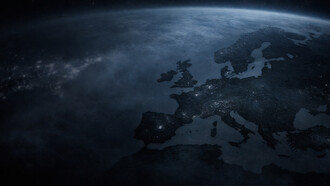If you google "international holidays," you'll find that people look for any excuse to celebrate. The international calendar has special days for almost everything, from toilets to waffles.
We have our share of special days in the United States, including Mother's Day, Valentine's Day, Thanksgiving, Memorial Day, and New Year's Day. The international calendar shows we’re missing a lot of potential holidays. People elsewhere have set aside special days to honor wetlands, radios, forests, kidneys, poetry, water, malaria, foreign languages, books, space flight, equal pay, jazz, tuna, intellectual property, happiness, migratory birds, museums, desertification, yoga, seafarers, breastfeeding, drug overdoses, the ozone layer, rabies, music, skeptics, vegans, philosophy, television, mud, asteroids, ice cream, forgetfulness, clams, beans, chocolate wafers, postage stamps, Alice in Wonderland, and jokes.
Thankfully, a few special events honor the Earth. Last March, more than 400,000 people worldwide participated in Earth Hour, promising to do something for the planet in 60 minutes or less. Every April 22 is Earth Day. For the last 50 years, millions have held events on that day to support environmental protection. On the first day of every September, the Christian community celebrates the Season of Creation, a roughly one-month period in which people are supposed to renew their relationship with creation and the Creator. Because nature is nondenominational and the Earth cares for saints and sinners alike, people of all persuasions can participate.
So, we have an hour, a day, and a month to focus on our connections with nature. It hasn’t been enough to discourage civilization from inflicting massive damage on the biosphere, i.e., the parts of the Earth where life exists. The human impact on the Earth has been so bad that geologists may declare a new epoch in world history, the Anthropocene, to acknowledge that our species has replaced tectonic shifts, erosion, and ice ages as the dominant force on the planet. Geologists cite lots of evidence for the Anthropocene, but it's all negative. It ranges from plastic pollution and pervasive toxins to biodiversity loss and global climate change.
In addition to remarkable achievements, and sometimes because of them, we have pushed the planet's life-support systems to their limits. Scientists have identified nine planetary thresholds we can't cross without triggering abrupt changes in the relatively stable environmental conditions that allowed civilizations to prosper these past 11,000 years. We have already crossed four of the thresholds.
We deserve an epoch of scolding for what we've done, but what if the Anthropocene represented something positive, like a period in which humans finally accepted their place as stewards of nature? What if we established the Anthropocene by dedicating the rest of this century to restoring the ecosystems, ecosystem services, and natural capital we have degraded or destroyed in the name of industrialization and materialism?
As Margaret Mead pointed out, "We won't have a society if we destroy the environment."
Climate change is arguably the most important of the nine thresholds because climate affects virtually every aspect of life. The science is complex, but the solution is straightforward: We must stop using fossil fuels. We have the technology and natural resources to power the world without them. We don't have the technologies or the time to make them harmless. Yet after 31 years of international negotiations on preventing climate catastrophe, fossil fuels still provide 80 percent of the world's energy. As Pope Francis plans to say on the opening day of the Season of Creation, "It is absurd to permit the continued exploration and expansion of fossil fuel infrastructures."
While the oil, gas, and coal industries want us to believe the transition to clean and renewable energy would cause irreparable damage to the economy, the opposite is true. The global consulting firm Deloitte warns that unchecked global warming would cost the world economy nearly $180 trillion over the next 50 years. The international community could use that money to achieve the 17 sustainable development goals the United Nations calls the "shared blueprint for peace and prosperity for people and the planet."
On the other hand, the World Resources Institute has shown that every dollar invested in restoring degraded land results in up to $30 in economic benefits. In 2016, the Federal Reserve Bank of Boston reported that environmental-protection laws in the United States created ecological restoration programs in every state, amounting to a "restoration economy" that resulted in $9.5 billion in economic output during 2014.
Restoring threatened or broken ecosystems would revive the many services they provide to civilization at no cost, ranging from flood avoidance to pollination. There are intangible benefits, too. Psychologists say our exposure to green and blue nature provides benefits artificial intelligence and machines cannot -- sharper attention, lower stress, improved mood, fewer risks of psychiatric disorders, and more empathy and cooperation.
A biophilia hypothesis posits that our species evolved in wild places, relied on nature, and found life and nourishment in it, giving us an innate drive to connect with the natural world. Technologies provide us with comfort, convenience, and the ability to travel to other planets. But nature nourishes our souls. The question is whether we can live useful and satisfying lives if we lose our connection with nature in a rapidly evolving, unnatural world. The answer is we cannot – not as fully evolved and actualized human beings.
To appreciate this, the Season of Creation should be a period of mindfulness rather than mirth, a time to focus entirely on the life within and around us. It's genuinely amazing.
For example, we are creatures of the universe as well as the Earth. Scientists have determined that 97 percent of the human body consists of atoms created by stars in the distant past. We are literally made of stardust.
As we walk the Earth, a spoonful of the soil under our feet contains more busy microorganisms than people on the planet. The forests we cut down are members of the oldest living community on the planet. The oldest living tree is over 5,000 years old, a bristlecone pine in California. A cypress in Chile vies for the title, but vandalism and drought threaten it.
Trees are among the most remarkable multi-taskers in nature. We are engaged in a symbiotic relationship with them. They inhale the carbon dioxide we exhale while we inhale the oxygen trees exhale. Seven or eight trees produce enough oxygen to keep a person breathing for a year.
When we bathe, we use water that may have come from interstellar ice crystals older than the Earth and Sun. The amount of water on and in the Earth is always the same; It simply changes into a solid, gas, or liquid. It may stay in the atmosphere for about nine days, trickle into shallow groundwater for 300 years, or remain in an ocean for over 3,000 years. Water deep underground can stay there for 10,000 years.
The apples, plums, and other fruits we eat are the wombs they formed to protect the seeds carrying their genetic codes. Fruits and many other foods would not exist without bees, wasps, or butterflies to pollinate them.
When we die, the elements in our body become food for other organisms, and life in the biosphere continues. But part of us may also return to the cosmos. As I've written previously:
A small part of us becomes helium that floats off into space, where it may be captured by the sun, or another planet, or where it may leave the solar system and drift off into what the fearless space explorer Buzz Lightyear calls "infinity and beyond." In the millisecond between life and death, you may discover the answer to the most mysterious question of all: Are we humans annuals or perennials? Until that time comes, we bumble through a miraculous, mind-boggling array of life serving us and the world around us with the knowledge it has refined through 3.5 million years of evolution.
Even with the world's population rising and longing for middle-income lifestyles, sunlight, wind, water, and plants offer us more than enough energy for civilization to flourish. They are free and sustainable. They can democratize power production. They do not pollute. No power plant on Earth can do what the Sun can: deliver clean energy in just over eight minutes from 93 million miles away and continue doing it for another 5 billion years. Its only drawbacks are that Big Oil can't profit from it, and OPEC can't control our supplies.
So, we don't have to invade the Earth and choke the atmosphere to run civilization. We need only accept what the sun and Earth freely give us. But must do it soon because we're running out of time. Learning to accept what nature gives freely and to live in productive harmony with it should be the world’s mission for the rest of the 21st century.















